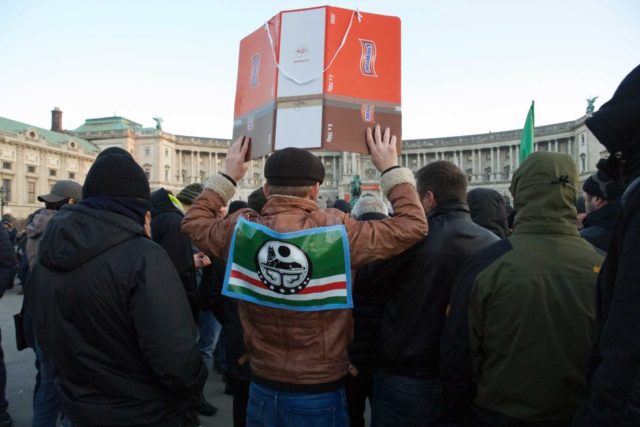
Chechen Diaspora Suffers as West Seeks Common Ground With Moscow on Fighting Terrorism
Publication: Eurasia Daily Monitor Volume: 13 Issue: 157
By:

Against the backdrop of Western sanctions against Russia, European countries are increasingly trying to defend their cooperation with Moscow by saying it is vital for their efforts to combat international terrorism. Chechens, who are scattered across Europe, often become targets of such cooperation. The Chechen diaspora in Europe is fairly sizeable. No precise figures exist, but they are likely to be in the six digits: there are probably at least 150,000 Chechens living across Europe (Caucasian Knot, April 5). The largest Chechen diaspora is in France, and is comprised of about 40,000 people. The second-largest Chechen diaspora, with about 30,000 people, resides in Austria. The third largest—about 20,000 members—is found in Belgium.
It is still difficult for Chechens to leave the Russian Federation. As of September, nearly 1,500 Chechens have for months been stranded at the border between Belarus and Poland, in the hopes of crossing into the European Union (Dosh, September 27). The causes behind Chechens’ departures from their homeland in the North Caucasus differ among individuals. Nonetheless, European authorities appear to have grown adamantly opposed to all Chechen refugees. The way Russians portray Chechens domestically is automatically projected on the Chechens in the West, as well.
For example, one would think that the sanctions the West imposed on Russia would make extradition of Chechens from the EU to Russia less likely. In fact, such extraditions have intensified. In 2016, from France alone, the authorities deported 17 Chechens to Russia. Mansur Kuduzov is the latest person to date to be extradited from France to Russia. Kuduzov did not become an Islamist in Chechnya and then move to Europe; he arrived in France as a child and radicalized there (Rfi.fr, September 9). So, French authorities should ask themselves why some refugees to their country are radicalizing once in France, instead of integrating into their new society. Extraditions continue even though a French court expressly outlawed the return of Chechens to Russia (Onkavkaz.com, July 8).
After the rise of several high-profile Chechen commanders within the Islamic State, European authorities started to watch the movements of Chechens more closely, especially when they visit Turkey and Egypt. A well-known Chechen journalist, “M.A.,” who works for a highly regarded European radio station and is a legal resident of Austria, visited Turkey in the spring of 2016 on business, related to her professional activities. After her return, she had to explain to the authorities why she had gone to Istanbul. In another case, a 22-year-old Chechen, “I.A.,” went to Turkey in 2015 to marry a Chechen female from Istanbul. Upon his return to Paris, the French police detained the young man and kept him in detention for one year, accusing him of ties to the Islamic State. A court eventually determined that the investigators had no real reasons to keep him in prison, and he was released in the spring of 2016. In May 2016, a Chechen family from Belgium was traveling to Egypt. The police allowed the wife and her children to continue on their journey, but the husband was detained and has been kept in detention ever since. The Belgian authorities have tried several times to put him on a plane to deport him to Moscow, even though the European Court of Human Rights (ECHR), in Strasbourg, suspended the Chechen suspect’s deportation procedure after his wife lodged an appeal. Brussels admits the Belgian security services had not detected any suspicious behavior from the detained man before. And the flight crew refused to transport the man to Russia after they saw how cruelly he was beaten up, allegedly by the Belgian police in broad daylight. Another Chechen, “V.D.,” is currently in an Austrian prison, where he is being held for alleged plans to join the Islamic State. The authorities built their case against him purely on the basis of the testimony of a young girl. Such cases are far from unique, and they are increasingly becoming commonplace throughout Europe (Author’s interviews, September 28).
These developments do not help Chechens integrate into Western European societies. Overall, the Chechen diaspora has a reputation for hard work and the pursuit of a good education. And yet, Chechen émigrés are constantly finding themselves having to incessantly prove they support democracy and reject the Islamic State (Inosmi.ru, March 3).
It would be incorrect to assert that the population of Chechens in the West is homogenous or that there are no radicals among them. However, radicalization among Chechens in Europe is negligibly small, and there is actually no supporting evidence for Chechens being more vulnerable to radicalization—apart from the stereotypical image of the warlike Chechens who fight in the Middle East. For example, to date only a handful of Chechens have been sentenced to prison terms in Europe on charges of radicalization or engagement with the Islamic State in Syria and Iraq, even though there are thousands of radicals in European countries (Inosmi.ru, March 3; BBC News, April 27).
The European security services’ policies toward Chechens indicate that European governments are trying to find common ground with Moscow and bypass the sanctions regime. European powers may be trying to use Chechens as a channel of communication with Moscow, behind Washington’s back. Despite the sanctions, ties between the Russian and Western security services have been intensifying. Even in Turkey, some Russian citizens who were in prison for crimes committed in the country were suddenly released in the spring of 2016. Western countries seemingly compete with each other to provide as many services to the Russian government as possible despite the sanctions. But such policies are unlikely to succeed, because Moscow traditionally regards concessions as a sign of its opponents’ weakness.



